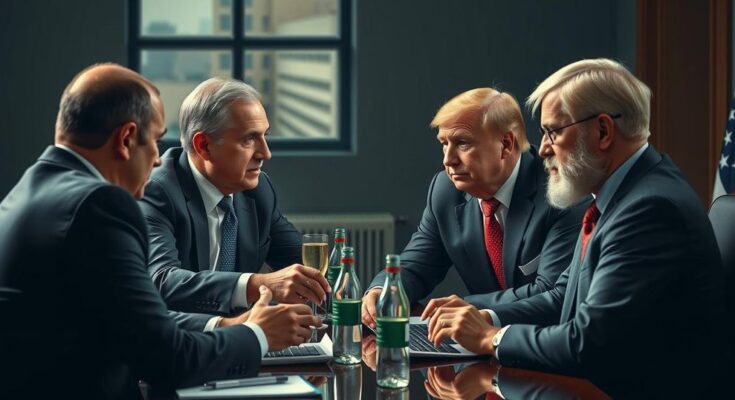Following Donald Trump’s electoral victory, Russian President Vladimir Putin displayed signs of manipulation towards Trump. Putin’s delayed acknowledgment of Trump’s win and insinuations about Trump’s obligations to Russia raise concerns regarding the latter’s influence. This dynamic reflects a broader effort by Russia to undermine American democracy through misinformation and political leverage, posing critical challenges for Trump’s foreign policy approach.
Since Donald Trump’s recent electoral victory, Russian President Vladimir Putin has engaged in actions that suggest manipulation of Trump. Initially, Putin delayed congratulating Trump, potentially increasing Trump’s anxiety about his standing with the Russian leader. As information emerged about the content of their conversations, the Kremlin dismissed Trump’s claims, leaving room for uncertainty regarding Trump’s influence over him. Moreover, a statement from Russian intelligence chief Nikolai Patrushev implied that Trump has obligations to Russia due to their alleged support during the election, signaling potential leverage over him. This reflects a more extensive strategy by Russia to create discord and undermine American democracy, which could challenge Trump’s approach to foreign policy, particularly his inclination towards Russia. Considering the broader context of Trump’s past admiration for Putin and the Republican Party’s position on aligning with Russia, the situation raises crucial questions about Trump’s future actions and relationship with Russia. In the recent political climate, President Trump has expressed admiration for Vladimir Putin, indicating a possible shift in American foreign policy towards closer ties with Russia. However, skepticism remains, particularly after reports of Russian interference in the electoral process. Incidents such as the dissemination of disinformation about Vice President Kamala Harris during the campaign and threats directed at polling places suggest a systematic effort by Russia to manipulate perceptions and sow chaos. Despite the absence of evidence linking Trump to these actions, the implications of his potential involvement raise concerns about his relationship with the Russian government. The Russian government’s decision to engage in psychological warfare by implying Trump has obligations to them serves to further complicate his presidency. The MAGA movement within the Republican Party supports this reset in relations, further entrenching the notion that Trump might overlook or downplay Russian aggression for political expediency. It therefore remains uncertain whether Trump recognizes Putin’s true nature, or if he will adjust his foreign policy approach accordingly. As developments unfold, the nature of Trump’s engagement with Putin will be pivotal to understanding both domestic and international implications.
The article discusses the growing tension and potential manipulation linked to the relationship between Donald Trump and Vladimir Putin following Trump’s electoral victory. Within just a week after Trump’s win, Putin’s initial delay in congratulating him and subsequent statements from Russian officials suggest a strategy aimed at putting pressure on the new President. The context includes past Russian interference in U.S. elections, disinformation campaigns during the recent election, and the broader implications for democracy in the United States. Understanding these events sheds light on the potential dynamics of Trump’s foreign policy towards Russia and implications for international relations.
In conclusion, the events surrounding Donald Trump’s electoral victory underscore a complex interplay of admiration, manipulation, and geopolitical strategy involving Vladimir Putin. As Trump’s intentions towards Russia become clearer, the relationship may face significant scrutiny, particularly in light of Moscow’s demonstrated willingness to exploit political dynamics within the U.S. Ultimately, Trump’s recognition of the limits of personal relationships in matters of national interest will determine the future trajectory of U.S.-Russia relations during his forthcoming term. As he navigates this relationship, it is essential for Trump to remain vigilant against external influence that seeks to compromise American democracy and international integrity.
Original Source: slate.com




